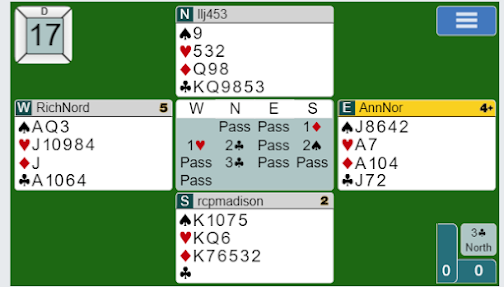Problem: Larry Johnson and I freely admit we botched the bidding on this hand. However, surprise, we made the bid. We invited Vic to comment on the bidding and hand. I asked a question about Gerber regarding asking for aces. That was not necessarily a good question, either. I would say after his critique that we will try not to make the same mistakes again.
Vic:
I assume 2C is the commonly
used Strong 2C bid that promises 22+ points, but says nothing about
distribution. Is that correct?
Over a Strong 2C opening bid
the most common partnership agreement is that Responder automatically bids 2D
(a "waiting" bid that gives Opener the chance to make a call that
describes their distribution - it says nothing about diamonds).
What on earth is Responders
4C bid? I do not have a clue.
If Responder bid 2D as I
would have expected, Opener would then bid 2S, saying they have at least a
5-card spade suit. That bid is forcing. Responder MUST bid again, even with the
pitiful hand they have.
Ideally, the partnership
agreement includes a way for Responder to warn Opener they are weak. A good
agreement for inexperienced players is that a second bid of 3C by Responder
warns Opener of a weak hand. It also warns that Opener should not expect
Responder to bid a third time. It says nothing about Clubs. This agreement is
often called "Second Negative".
Subsequent to a "Second Negative"
bid of 3C by Responder, Opener needs to set the contract they want to play the
hand in, knowling that partner's hand will be of little help. If I held the
West hand above, my third bid would be 3H, describing a two-suited hand &
asking Responder to let me play at the three level in which ever one of the two
majors they can help with the most. Obviously, Responder should Pass & let
Opener play in 3H. Depending on the skill level of the Declarer & the
Defenders, West might even make 3H.
As for Gerber, I have been
averaging 2-3 duplicate bridge games a week for almost 20 years & have
found myself sitting at a table where Gerber was used I am guessing a half
dozen times or less. I was informed roughly 18 years ago by a woman with over
10,,000 master points at the time that "Even Gerber does not use Gerber
any more.". Gerber is the name of a baby food. It has no place in modern
bridge. You should forget you ever heard about it.
Also, there is no point in
asking for Aces with the pitiful hand East is holding above. For that reason as
well I certainly hope the 4C bid above was not intended to be Gerber.














